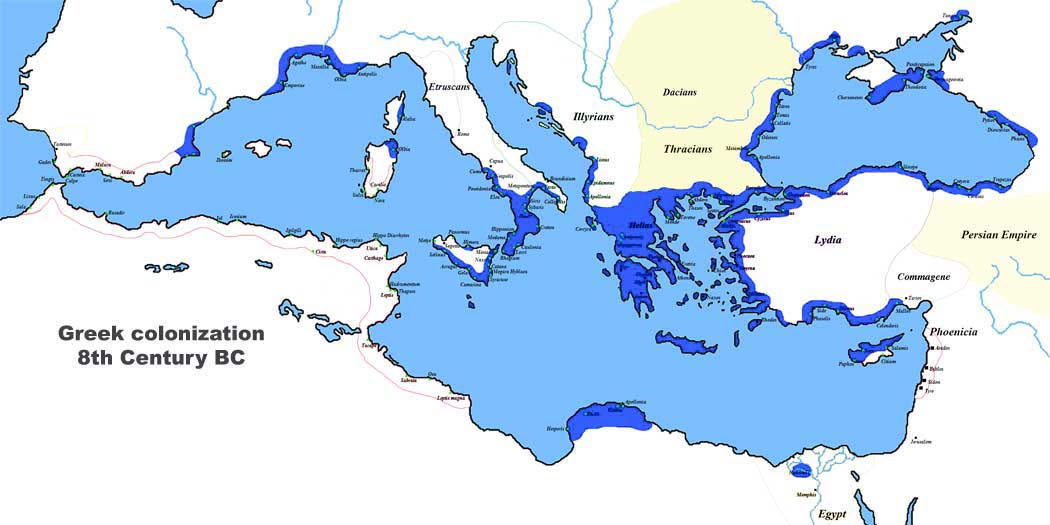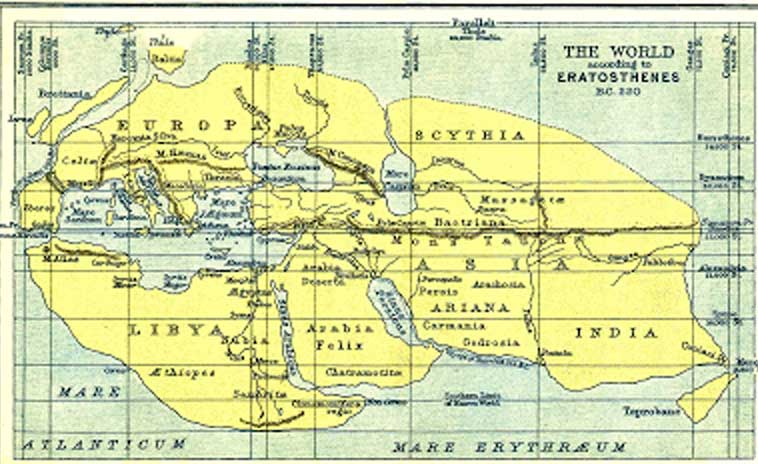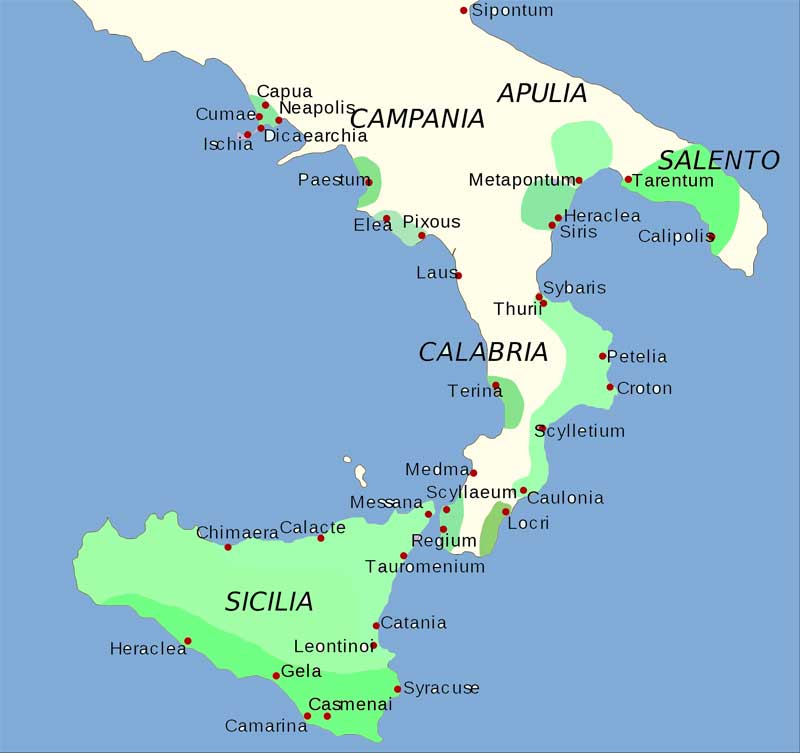The first and second Greek colonisation
With colonization and geographical expansion, the Greek horizon grew, Greek populations came into contact with a multitude of peoples, and cultural interactions multiplied. On the Greek side, particularly noticeable in the 7th BC. century are the Eastern influences, most of which, as we would expect, are due to the contact of the Greek colonies of Asia Minor with their oriental neighbors.
The various Greek tribes naturally continued to speak in their own dialect, just as each place had its own idiom; and the linguistic differences were also transferred to the colonies, which again each kept the dialect and idiom of the metropolis.
A common language had not been formed in the archaic years, but of course, the communication between the Greeks did not present particular difficulties. The dispersion of Hellenism in the colonies and its division into smaller political units, the city-states, was offset by strong unifying forces.
The special relations that bridged the decentralized colonies with their Greek metropolises, the various agreements between the city-states, the defensive alliances, the religious associations (ἠφικτιονια), the Pan-Hellenic games and the Pan-Hellenic divination, festivals and pilgrimages – all these not only restrained but also strengthened the unity and self-awareness of the Greeks in the Archaic era.
Religion held an exceptional position in the social life of the archaic centuries. Both at the individual and communal level, in the limited local cults and in the Pan-Hellenic sanctuaries, in the formal worship of the Olympians, (as established by Homer and Hesiod), and in its occult orgiastic and sacramental manifestations.
Archaic piety was deeper and more intense than ever before in the ancient world. Characteristic was the rapid increase in the importance of the oracle of Delphi, on the ὀmphalon of the earth, where the strict and distant god Apollo had given a place next to him to the more popular god, Dionysus.
The first Greek colonisation
The Greek tribes from about the middle of the 11th c. BC until the 9th century e.g. they spread, with a bridge over the Aegean islands, to the western coasts of Asia Minor. These migratory movements are known as the first Greek colonization.
Greek tribes who spoke the Aeolian dialect, moved from Thessaly to the north-eastern Aegean and settled on the islands of Tenedos and Lesbos and on the opposite coast of Asia Minor, in the area called Aeolis.
The Ionians, another Greek tribe, from the north-eastern Peloponnese, Attica, Euboia, bringing along “many other nations” (Herod., A, 146), such as Dryopes, Molossians, Arcadians, Phocians, Magnetes, etc., with a bridge the Cyclades they moved to Samos, Chios and the opposite coasts of Asia Minor, where they founded twelve new cities.
These cities then formed a religious union, the Panionium, centered on the sanctuary of Poseidon, on the promontory of Mykalis. The spread of the Ionians was progressively at the expense of the other races, with the result that the entire west coast of Asia Minor became known by the name of Ionia.
Finally, the migration of the Dorians followed. The Dorians did not move as refugee groups, pressed by other races. They are probably the first Doric groups to know the sea. They left Laconia, Epidaurus, Troizena and settled in Milos, Thira, Crete and then in Rhodes, Kos and the south-western coasts of Asia Minor.
The cities of Ialyssos, Kamiros and Lindos of Rhodes, the city of Kos, as well as Knidos and Halicarnassus in Asia Minor, then formed a religious union, known as the Doric hexapolis, centered on the sanctuary of Apollo, on the Triopian cape of Knidos.
All the Greek races that migrated to the islands of the eastern Aegean and the coasts of Asia Minor quickly acquired a permanent settlement in the new places and gradually expanded inland. In some cases they mixed with each other and also with the native populations.
The 8th century saw an unprecedented colonization of the Greeks beyond the narrow limits of the Aegean into the rest of the Mediterranean by establishung several colonies controled by Greek city states. Certainly, the commercial activity of the Euboeans with the island of Pithecus helped to start such an expansion. This commercial dominance is the generative cause for the massive establishment of cities and the Greek expansion over a large geographical area.
The ancient known world
About the one third of the known world at the time belonged to basically Greek cities. Of course, we must not forget that at the same time there is another phenomenon in progress. It is about the intense urbanization of the Greek area and by extension the Mediterranean, with the merging of settlements into one city. We are now leaving the isolation of the 10th and 9th centuries behind us.
Having examined the time, let’s focus on the protagonists since there is a question about their identity. Opinions conflict as to whether those who undertook the establishment of the colony were sent by the city or were individuals seeking new opportunities. In both cases depends on the colonizer city. It may be that in a city where there was no economic space (trade opportunities and available land) for a serious number of people, the solution of colonization was preferred, or simply that a city wanted to expand its economic and military influence.
Note that many times the aristocrats of a city saw it as an opportunity to weaken the opposition in the city, appointing other aristocrats as leaders of colonizing missions.
As far as the place is concerned, the Greeks turned to neighboring southern Italy, Sicily, the Adriatic, the Ionian, Cyrenaica, which flourished in the Hellenistic years, the straits of the Hellespont, the Black Sea, an area rich in wheat, southern France and distant Spain.
This is due to the existence of organized states, the Phoenician and the Egyptian respectively. Regarding northern Africa we have the spread of the Phoenicians. It is the awe-inspiring rival of the Greeks and their theater of conflict is Sicily on an economic and military level.
Greek colonies in Lower Italy and Sicily
As far as the place is concerned, the Greeks turned to neighboring southern Italy, Sicily, the Adriatic, the Ionian, Cyrenaica, which flourished in the Hellenistic years, the straits of the Hellespont, the Black Sea, an area rich in wheat, southern France and distant Spain. The Greeks did not operate in today’s Syria, Egypt (one colony: Naucratis) and in northern Africa (except Cyrenaica). This is due to the existence of organized states by the Phoenician and the Egyptian respectively. Regarding northern Africa we have the spread of the Phoenicians. It is the awe-inspiring rival of the Greeks and their theater of conflict is Sicily on an economic and military level.
The causes of colonization
The phenomenon of Greek colonization was caused by population growth and the accumulation of arable land in the hands of a few. Thus, the available land areas were reduced, with a direct risk of food shortages for certain social classes. Therefore, the escape from this unfavorable situation was the colonization of new regions. Of course, there were also political and social problems, such as the famine in Thebes and the Parthenians in Sparta. Of course, we must not forget the will to control the trade routes of the Mediterranean. Trade is now the key to the economic empowerment of the city and at the same time to its military superiority.
Important help was provided by the knowledge of the geography of the Mediterranean in the 8th century, as well as the assumption of leadership positions by aristocrats who gathered their spiritual and material forces in large ports to begin their journey. The place they chose to build their new city had to communicate with other cities and usually have physical fortifications. Also, the fertility of the soil was important, as well as the disposition of the local populations.
The relations of the settlers with the locals were determined by the intentions of the latter. Many times, the native populations were displaced or made up the working class of the city, as the new residents shared the available land and were the new aristocracy of the city. The colony’s relationship with its metropolis ranged from friendly to hostile in some cases. The colony was completely independent at all levels from the metropolis. For example, Potidea, although a colony of Corinth, was until 432 BC. in the Delian alliance and its only connection with Corinth was on a religious level each year.
The impact of colonisation
The effects of colonization became evident at many levels of Greek life. The contact with the foreign made the Greeks aware of the identity of their nation. The city-state model is entering a period of maturation, taking second place to tribal states. Greek culture radiates in the Mediterranean and receives the corresponding influences from the peoples it comes into contact with. Also, many mercenaries and artisans moved to the East, helping to develop the states that existed in the region. Finally, relations with the aristocracy of Scythia and Libya are strengthened.
The second Greek colonisation
The reasons that pushed the Greeks to emigrate during the second colonisation were mainly economic, but we could not overlook a series of reasons that were equally important, such as “crowding”, the serious demographic problem that arose from the great increase in the population and the limitation of arable land.
In addition, there was the need to supply iron ore, which was necessary for the manufacture of tools and weapons, the lack of grain that was not sufficiently produced in Greece, and the search for new markets for the supply of important raw materials and the sale of goods. In addition to these, the internal political reorganizations and quarrels, but also the character of the “risky Odysseus“, as stated by sources of that period, in connection with their knowledge of the sea routes and their destinations, complete the list of reasons which pushed those people to leave their ancestral homes en masse and in an organized manner.
The second period of expansion of the Greeks is characterized by the expansion of the places of origin as well as the places of settlement of the colonists. This new dispersion of Greek is mainly divided into two time periods. In the first period, from the middle of the 8th century until the first quarter of the 7th century. BC, Greek colonists settle in southern Italy and Sicily, coming mainly from Evia and various regions of mainland Greece. At the end of this period, residents of other regions of the Aegean, such as Rhodes and Crete, complete the migration stream.
The places from which the colonists of the second period draw their origin multiply, as Greeks from Asia Minor and the Aegean islands take part in the founding of the colonies. During the settlement in the areas of Italy and Sicily, new colonies and infrastructures were built, close to the old ones, but the resettlement of the Greeks extended to all points of the horizon, from the northern shores of the Aegean, the western shores of the Mediterranean, the Hellespont, the Propontis and the Black Sea, as far as North Africa.
The Greeks managed to dominate the sea routes of the Mediterranean and prevail in the field of trade, from the Heraklion Columns to the Caucasus, within a period of two centuries. As in the first, so in the second colonization, the shipping means of the time were still primitive, but the skillful and daring Greek sailors managed to cope with the difficulties and cross the Mediterranean sea from one end to the other. The Greeks reduced the art of sailing with sails to the most perfect and intelligent for the time, utilizing the experience, knowledge and daring of the high art of navigation.
The consequences of the Second Greek colonisation
It is a fact that the second Greek colonisation, the colonial expansion of the Greeks, over such an important area and period of time, was a phenomenon that decisively affected the economy and society and contributed to the cultural progress of the archaic times.
A real economic miracle was accomplished by the Greeks with the second Greek colonization, achieving an exit from the crisis of the time, beyond the boundaries of the city-state, within the wider geographical context of colonial expansion. Trade developed rapidly as did shipping, with the improvement and development of the means of navigation, due to the increased needs for long journeys, while the methods of metallurgy also evolved.
The economy of the Greek cities from closed domestic, rural and natural, becomes transactional, acquiring a commodity-monetary character with the minting and wider use of currency.The exchange and sale of goods between the colonies and their metropolises, as well as the indigenous peoples, dramatically increased trade and in turn the demand for raw materials, causing labor specialization, thus contributing to the increase of production.
A consequence of the increased demand for labor force, as the sphere of knowledge expands in many areas of everyday life, is the thematic increase in the institution of indentured servitude. The use of slaves as workers in mining, quarrying and various activities of economic life was the prevailing practice as a factor of economic development, as it ensured cheap labor.
The significant changes in the economic environment of the era of the second Greek colonization, favor the changes in society, the creation of the first city-states and their political constitution. The result of these changes is the appearance of a new category of citizens, the one who got rich from economic activity and sought to play a decisive role in the province of power, but also to improve its social level.[20]
Undeniably, however, the first consequence of this migratory flow of Greeks was the spread of Greek culture, as the settlers did not sever their ties with the homeland.
Greece shone because of its colonies, as the Greek colony spread its wings to new horizons of culture and wisdom, based on its ideals. She transferred her new experiences to the metropolis, exchanged her wealth and at the same time accepted the social, political, legislative, religious, spiritual and cultural institutions, which she developed to the fullest. An example is the laws that were established in some colonies and were an example for all Greeks.
An important fact is also the spread of the Chalkidian alphabet in Lower Italy and among the ancient Italian tribes (Stamnites, Latins, Etruscans, etc.), through Kymi, a colony of the Chalcidians in the area, constituting the theoretical support of the later Latin alphabet. They introduced their alphabet to other peoples, in areas where there was no writing, along with the traditions, the language and the myths intertwined with it, at the same time transferring to the new homelands the techniques and the art of war.
The Greek settlers, in their contacts with the villagers, exchanged cultural components of their culture, learned from them to make bronze and clay figurines and embraced figurative decoration on vases and tombs, based on archaeological findings.
The natives, however, do not exert a significant influence on the Greek colonists.


